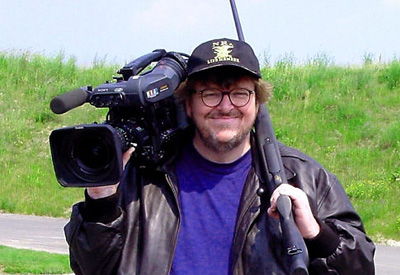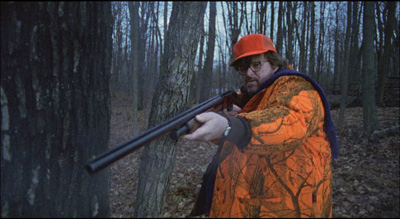Bowling For Columbine
Guns don't kill people, Americans kill people

Winner of countless audience awards at film festivals world-wide, and the 55th Anniversary Award at Cannes, this hard-hitting, bitingly-satirical documentary from Michael Moore (those of you unfamiliar with the name may remember him from the BBC2 television series 'TV Nation') will scare you, but hopefully give you pause for thought too.
Taking its name from the activity the two boys were doing on the morning they killed or injured several of their fellow pupils at Columbine High School in Littleton, Colorado, Bowling for Columbine sets out to discover just why the US is so 'gun crazy'. Featuring archive footage, interviews and a wonderful cartoon, 'A Brief History of the United States of America', Moore delves into the history and hypocrisy of gun ownership in the US, and attempts to provide reasons why more than 11,000 Americans die every year from being shot.
Making excellent use of the juxtaposing of humour and heartbreak to drive home his point, Moore presents us with some sobering facts, which seem the more poignant for having been preceded by laughter.
Showing a clip of comedian Chris Rock, in which Rock suggests that gun-related deaths could be massively reduced by making bullets cost $5000 each, causes much mirth in the audience, but he is making a very serious point - guns and ammunition are far too easy to come by in the good ol' US of A. The bullets which left so many children dead or injured at Columbine High School cost 17 cents each at the local supermarket.
The film also features interviews with people who have become infamous for their ties to violence. John Nichols is a friend of Timothy McVeigh (McVeigh was subsequently executed), and brother to one of the other individuals found responsible for the bombing of a federal building in Oklahoma City (Nichols was acquitted of all charges). Interviewed for Bowling for Columbine, the man claims he sleeps with a loaded .44 under his pillow, and while proving to the director that this is in fact true, points the loaded gun to his temple. Very intelligent - give the man a sweetie.
Moore presses Nichols on what he thinks are the reasons Americans should have guns, but he is unable to give a good answer. Indeed, when the director suggests to him, "Why not use Gandhi's way? He didn't have guns, and he beat the British Empire.", Nichols professes his ignorance - "I'm not... familiar with that." Anyone 'not familiar' with one of the most famous and important figures in 20th Century history should categorically NOT be allowed to own something whose primary, and indeed only, purpose is the ending of life.
We are introduced to many such luminaries, including a high school student who was put onto the authorities' suspect list after the Columbine incident as second most likely in his area to blow up or shoot his classmates (incidentally, rather than objecting, he seems more upset he didn't make it to No. 1 on the list) and a female member of the Michigan Militia, who claims that when most people call the police, it is because they have guns. Silly me. There was me thinking I'd call the police because it's their job, and that they exist to uphold the law. That's me told!

All of this builds up to the moment Moore has clearly been waiting for, an interview with a man who is a true visionary, a saint, an icon for millions. That's right; it's the President of the National Rifle Association - racist, pro-gun nut and all-round stupid person Charlton Heston. It is a joy seeing him squirm under Moore's questioning, and feebly trying to dismiss the USA's gun problems as due to a bloody history (despite the fact, as the film points out, that Great Britain, Japan and Germany all have long and bloody histories, yet they don't have anything even approaching the level of violence the US does).
However, this depressing thought accompanies you as you leave the cinema - Heston's, and America's, attitude is unlikely to change, and more people will listen to him than to the points made in Moore's film. Americans love their guns, and until the media changes and the culture of fear in the United States diminishes, too many people will use their guns far too readily.
Not all hope is lost though - aside from Moore, there are many people who realise that things are in a bad state, including Matt Stone and the much-vilified Marilyn Manson, both of whom make astute observations in the film. There are also intelligent testimonies from many others, including the Mayor of Flint (Moore's hometown in Michigan, where a 6 year old girl was accidentally killed by a classmate with his uncle's gun) and the Genesee County sheriff. All hope is not lost.
Though some of the points are made subtly, Bowling for Columbine feels at times heavy-handed, but there is perhaps no other way for Moore to deliver his message, certainly not if the likes of Charlton Heston and John Nichols are in any way representative of the majority of the American population. Given the points raised, this film should be required viewing for all Americans, and with any luck, enough people will see this movie and do that most rare of things - think.
Bowling for Columbine is an excellent film, Moore's best work to date, and the accolades of 'Best Documentary Ever' appear to have some justification. As such, Bowling for Columbine achieves the maximum 5 Combined Goodness Units.
Matt Stone (Himself)
Marilyn Manson (Himself)